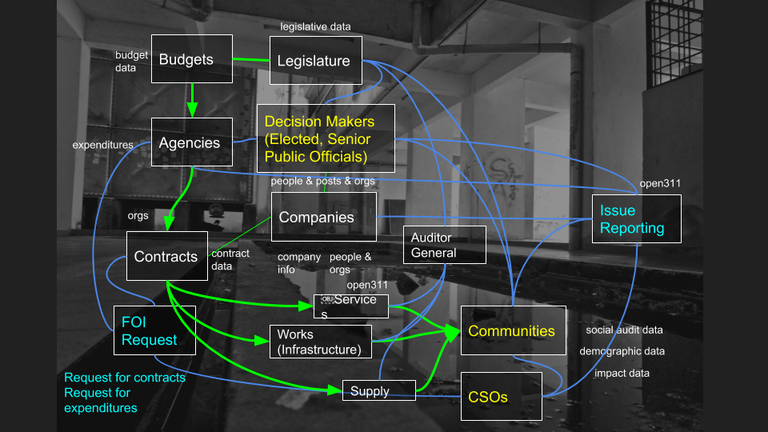
Parliamentary Answers as Source for Data Demand and Government Oversight
Official recorded Parliamentary Answers are an overlooked official government source for data, status of government programmes in detail, demanded by citizens, elected representatives, executive branch of government and civil servants.
A way of identifying key open datasets
A common problem for government open data programmes is to identify and prioritise which datasets should be made available. Common methods used include conducting surveys, workshops and measuring against criteria of global indicators such as Open Data Barometer.
Parliamentary Answers are also an excellent source for identifying data demand, that involves and benefits multiple stakeholders. There is also accountability for quality, as the answers are official positions of the executive who are answerable for the reply provided.
- Citizens. Elected Representatives submit and ask questions on issues that matter for their constituents.
- Elected Representatives. Demand official answers to questions on issues of importance for their constituents.
- Executive. Respective ministers are responsible in answering questions satisfactorily. Accurate data and status of programmes are important, they will be held accountable for poor data or status of programmes and policies. Poor data, will also lead to poor answers and decisions.
- Civil Servants. Civil servants, need to rapidly prepare answers for respective ministers, often within very short time frame, especially for replies for oral questions that are debated in parliament. Quality open data across departments, agencies and ministries to answer these questions will allow them provide answers rapidly without bureaucratic barriers.
Impact
Given that parliamentary questions cover a wide variety issues for stakeholders, from data providers to users, repeated parliamentary questions for specific datasets should be flagged as a priority to be made available or improved. This data is related to government programmes and policy usually involving hundreds of millions if not billions of dollars for key industries and investments, and also socioeconomic indicators such as crime, health and poverty.
Case Study: Crimes Against Children
In 2008, a directive was issued by Malaysian police to suppress crime statistics from being published online or shared widely.
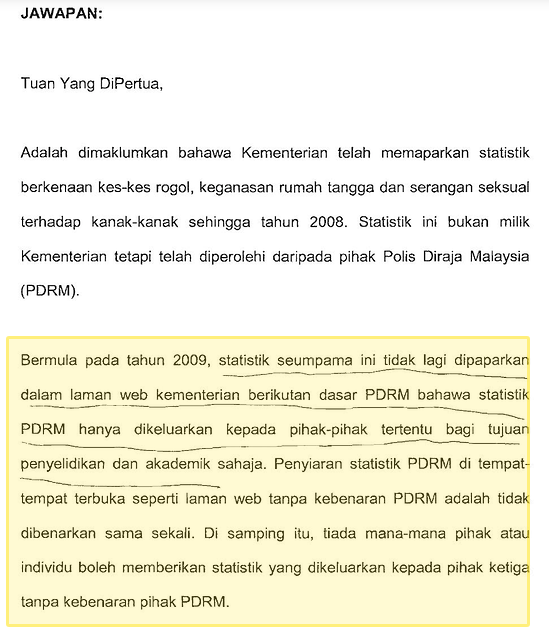
Parliamentary reply to R. Sivarasa [ Subang ]
Since 2013, that led to at least 58 questions by elected representatives asking for crime statistics, from bullying, corruption, theft to sexual assault. There are hundreds more repeated questions asking for crime statistics without mentioning the word crime. For sexual crimes alone it was asked up 35 times. This would be a clear indicator of an social issue of importance to constituents for which open data would be crucial for effective policy for legislative work.

Parliamentary Question by Steven Sim [Bukit Mertajam]
This question was one of many asked by elected representatives on behalf of their constituents including civil society organisations working in this area. On multiple replies, official data clearly showed a serious problem of child sexual predators in Malaysia.
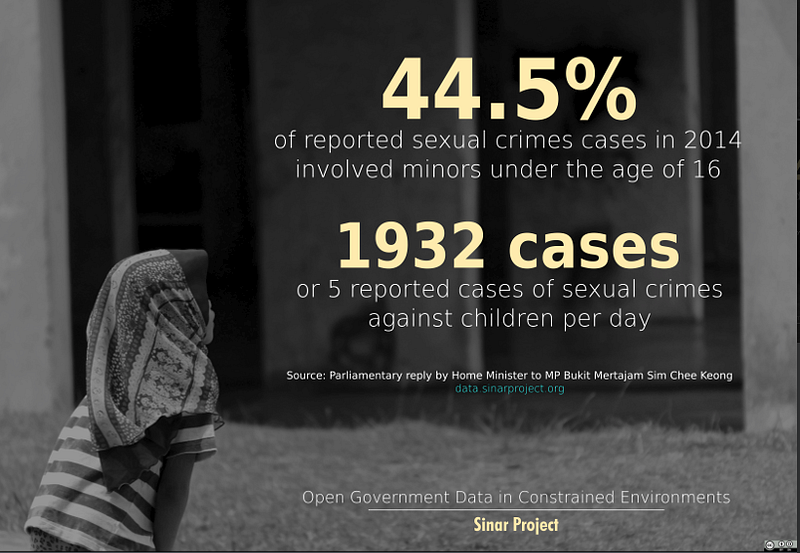
A simple text visualisation of key figures would already highlight frightening statistic on the number of sexual crimes against children in Malaysia.
Any issue in parliamentary representatives affects multiple stakeholders
- Civil Society Organisations for protection of children need this data to raise the problems they see on the ground and to have confirmation of data from official sources
- Elected representatives and Ministers are accountable to their constituents who will keep asking what are they doing to act on this issue
- Sexual Offenses Against Children Act 2017 was passed
- Journalists will continue to expose unresolved issues even if data suppressed such R.AGE Predator In My Phone investigative report.
Crime Statistics are now published on Malaysian Government Open Data Portal, but dataset on crimes including sexual crimes against children are still not published.
Parliamentary answers serves as a strong indicator that accurate, detailed and up to date open data for sexual crimes against children should be made a priority to be published for Malaysia. Given the body of questions, we know that this dataset will continue to be demanded, and it is in the best interests of all including the executive that it be published as open data.
Parliamentary Answers Already Provide Data and Summaries for Complicated Government Processes
Public oversight of government is a difficult task. It involves billions of dollars and data sets from hundreds if not thousands of agencies and departments implementing countless projects under various government programmes. It is hard to know which government agency is working on what issue, and has the detailed answers and data you are looking for.
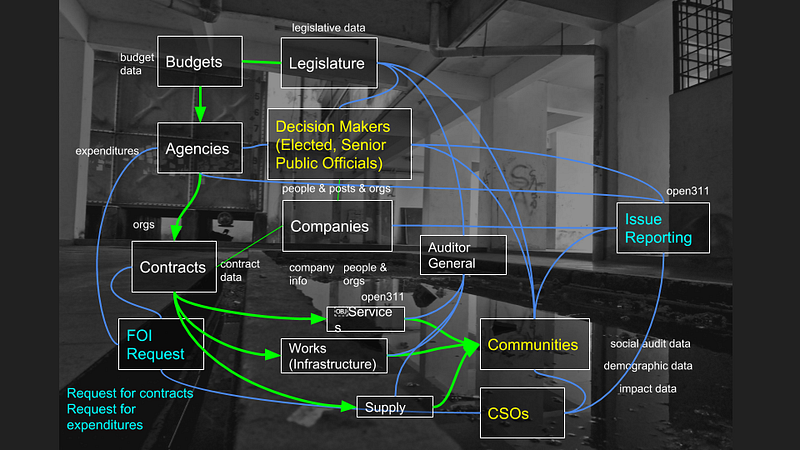
Open Data and Standards to close feedback loop
A lot of hard work by civil servants goes into providing parliamentary answers. A short question such as the sustainability of fisheries in Malaysia requires data from multiple agencies.
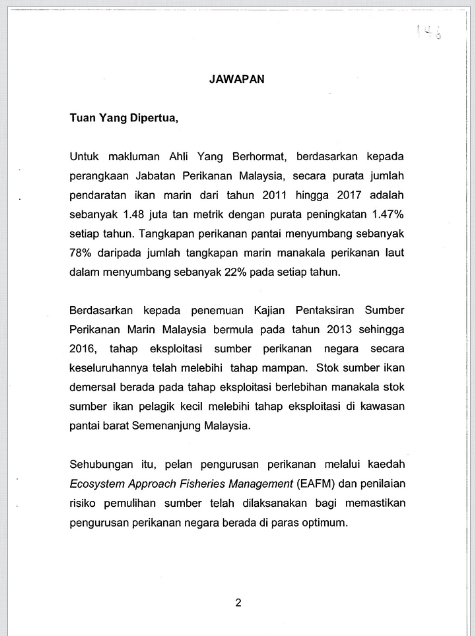
Parliamentary Answer to Dr. Michael Jeyakumar Devaraj [Sungai Siput]
Civil servants from the Ministry of Farming and Primary Industries, had to find data to provide average catch from 2011–2017 and growth rates. The source is specified in this parliamentary answers is from a survey done by Marine Fisheries agency, and they also highlighted their methodology for their answer.
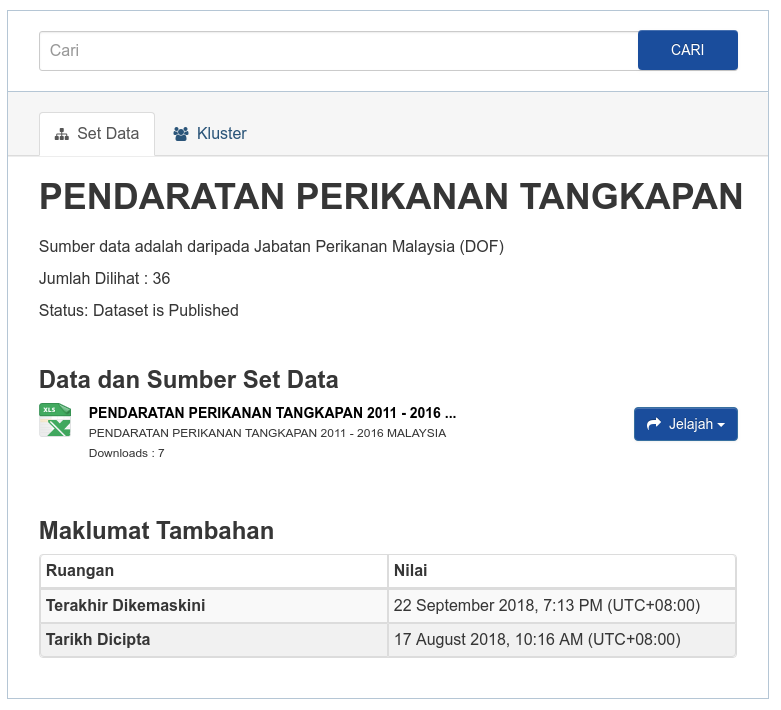
Malaysian Fisheries Catch Data 2011–2016
Instead of throwing this work away, this data would be useful for others, and also future research and oversight by environmentalists. Someone from the Ministry has already noted this, and shared over 222 detailed fisheries datasets on Malaysian Government open data portal.
This should not only speed up providing answers, but provides enough data for different stakeholders to ask more policy oriented questions or raise specific issues related to fisheries backed by data, instead of asking for more fisheries data and statistics.
Recommendations/Findings
- Ministries and Government Open Data Programme should review what kind of data is being demanded to answer Parliamentary questions and identify key datasets that should be prioritised and published as open data.
- Data demanded in parliamentary questions involve multiple stakeholders, all of of them should demand and ensure that this data is published as open data and be kept up date.
- Where data for an important issue raised in parliament is lacking or suspect, journalists can use parliamentary questions as leads that are on official record.
About Parliamentary Documents
Parliamentary documents is a project to make Malaysian parliamentary documents on-line. The current focus is to scan and publish on-line digital searchable documents that have previously not been made accessible to the public.
Parliamentary documents such as written replies provide detailed official responses on government policy and statistics by the executive to questions raised by your elected representatives. They contain difficult to find answers such as child marriages, crime, government project status and issues of mismanagement of funds or projects.
Help keep our services online
